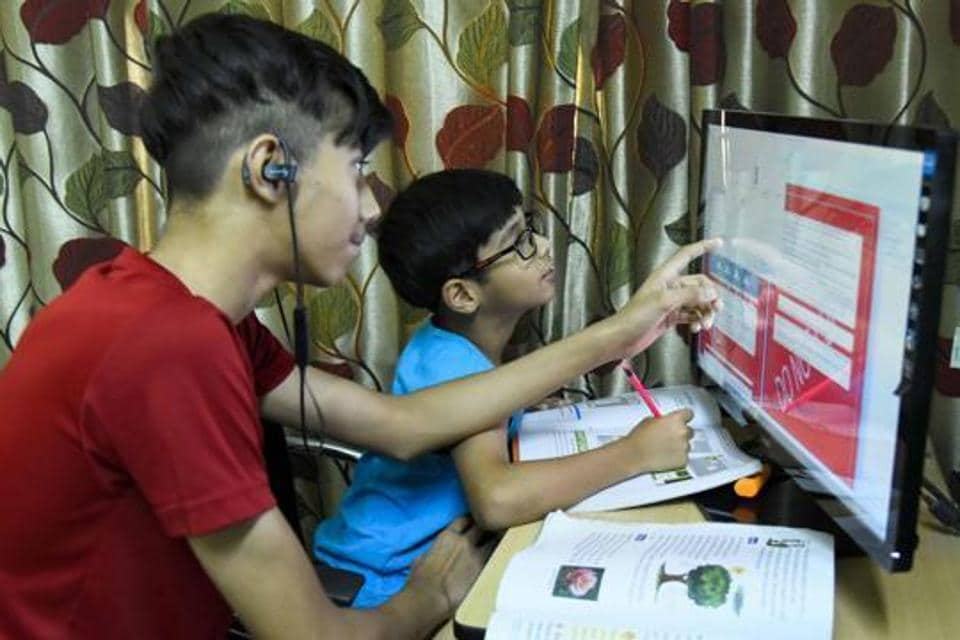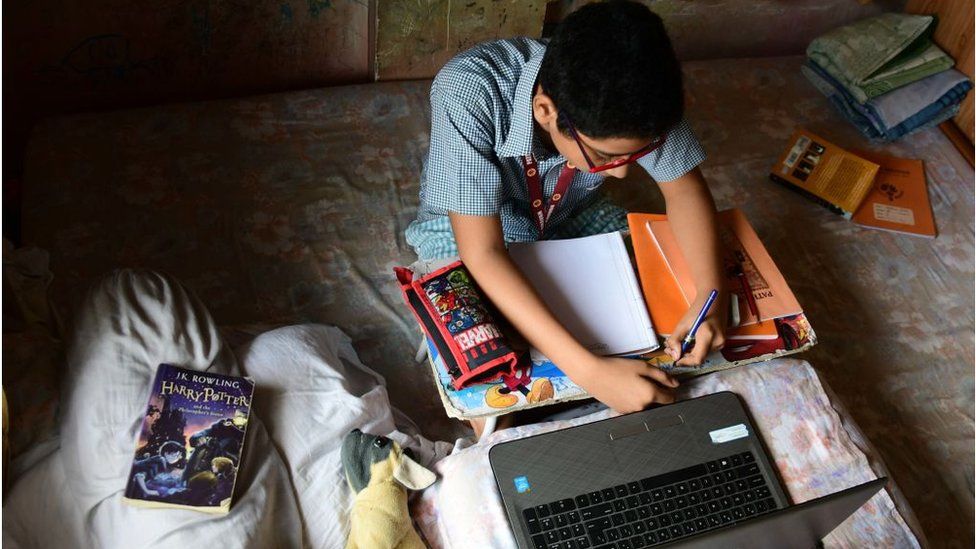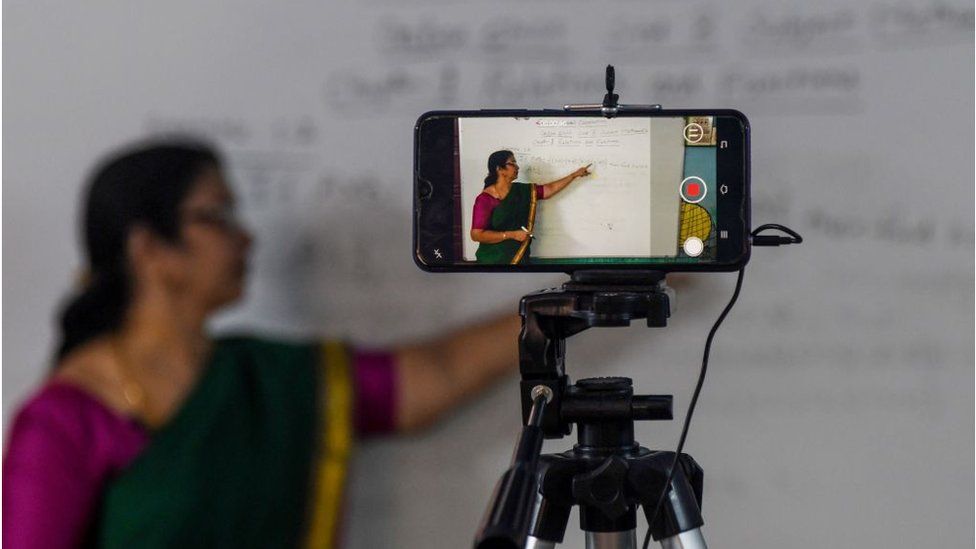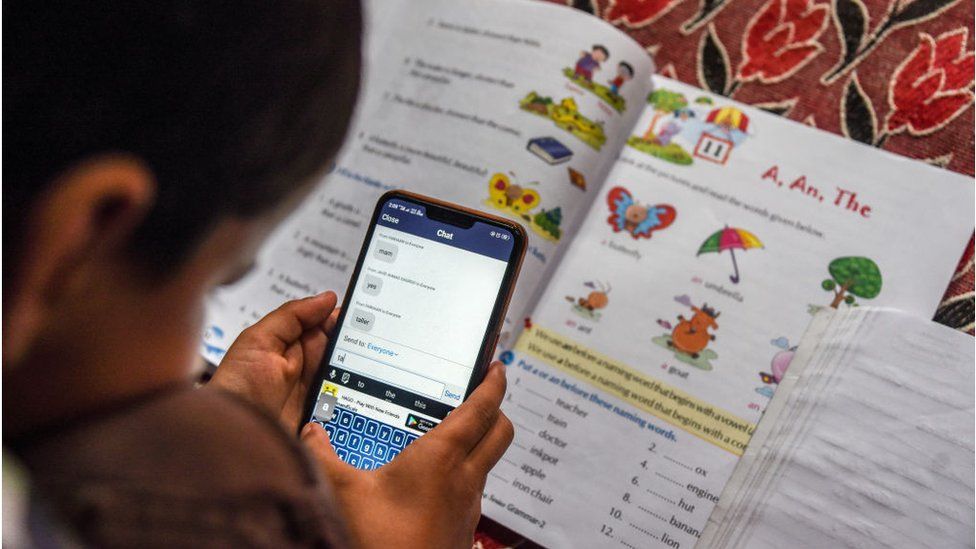Editor’s Note: FII’s #MoodOfTheMonth for August, 2021 is Digital Realities. We invite submissions on the many layers of experiences from the virtual world throughout the month. If you’d like to contribute, kindly email your articles to sukanya@feminisminindia.com
The Covid-19 pandemic has restricted students across educational levels to their homes. While talks of a digital divide have been existing even in the pre-pandemic times, the multiple lockdowns have highlighted how stark the differences in access to technology are, especially when one has to rely on it to gain education.
Azeema, a senior teacher at a network of schools catering to low income communities shared her experience of teaching children from low-income families and communities. “Teaching during a pandemic has been tough, and teaching children from low-income families is even more challenging. From getting in touch with all kids, getting them devices to get to ‘school’ to helping them balance health with academics, it takes a lot. Many of them had to migrate to their villages as their parents lost their sources of income.”
The visuals of lakhs of migrant workers walking back to their villages due to the lockdown are just as shocking a year later. Globally, innumerable students were pushed out of schools due to the pandemic. Reports from February 2021 suggest that in Delhi alone, 1,66,000 students fell off grid as schools moved online and officials at North MCD’s education department said that around 20% (58,000) of the 2,90,000 students enrolled across 714 schools could not be reached despite many attempts over the past 10 months.
The main reasons are estimated to be the online mode of classes and the migration of families due to loss of jobs. Azeema continues, “At the same time, the authorities expected teachers to build skills almost overnight. Online teaching over Zoom, making asynchronous learning packets, maintaining attendance – all while surviving through a pandemic. The learning gap is widening at a rapid pace, and a lot of students aren’t learning at all. This isn’t even considering students with learning disabilities, who require additional assistance. We have strategies to help them in class but on an online platform it’s almost impossible.”
She says that the past year has had a detrimental effect on students’ as well as teachers’ mental and emotional health. “Most teachers I know are either considering leaving the profession or are battling mental health problems. The system is severely lacking in terms of teacher support or teacher voice.”
most teachers mute all their students to minimise disturbance. However, that prevents students from asking questions and interacting with the teacher and their fellow students. This significantly hampers their socialisation and is vastly different from how it would’ve been in an offline classroom
Neetu, another teacher explained how the lack of direct contact with students makes it harder for teachers to understand the level of understanding and learning on part of the students. The students often don’t show up to class or turn off their cameras and possibly go away.
She further states that online testing mostly has to be in Multiple Choice Questions format that does not adequately inform the teachers of the students’ learning or their habit of writing. Most students who have migrated back to their home towns often do not have access to smartphones or have network issues and they miss out on what’s being taught in class.
At the same time, terms like burn out, anxiety, and just the idea of taking breaks are gaining more acceptance, which would have otherwise been stigmatised. However, they say that it is still difficult to focus online and motivate oneself to attend and excel at academics, “upskill” CVs, and do internships when one is already dealing with a mental health situation
“Online classes are a challenge for the teachers. Most are not well versed with technology. Lesson planning, making question papers, and checking assignments take a longer time, it takes me twice as long to make a google form than making question papers by hand.”
As a parent of two young children, she shares how her younger child does not understand most of what is taught and has to be brought up to speed by her. Additionally, most teachers mute all their students to minimise disturbance. However, that prevents students from asking questions and interacting with the teacher and their fellow students. This significantly hampers their socialisation and is vastly different from how it would’ve been in an offline classroom.

Hence, there is a serious lack of infrastructure to support the needs of teachers and students. Divya, a masters student, explains what it’s like to shift from physical classes to online ones, specifically in higher education. She shares that in her experience, they found it difficult to cope for most of last year, and had to push through the semesters. They believe while the system is bound to make you burn out eventually, the pandemic made them burn out faster.
Also read: Traversing Academia Amidst The Pandemic
At the same time, terms like burn out, anxiety, and just the idea of taking breaks are gaining more acceptance, which would have otherwise been stigmatised. However, they say that it is still difficult to focus online and motivate oneself to attend and excel at academics, “upskill” CVs, and do internships when one is already dealing with a mental health situation.
The shift to digital learning along with the unpredictable loss caused by the pandemic have not fully accommodated the needs of the people with neurodivergent diseases, mental health issues, and physical disabilities.

From the prescriptive of an educator in higher education, Vidhi, a teacher and a theatre facilitator shares, “The shift to the digital medium in the last one and a half years has been sort of mixed. On one hand it has given us the capability to continue with education, learning and teaching, even though we are not together in a physical space; at the same time, we’ve been made aware of the digital divide in our country.“
The learning loss for students in such situations can be immense, more so for students who already come from marginalised communities, and hope for education to be a means of social mobility. Vidhi talks of fatigue that has set in over time due to the digital exchange of learning and teaching, especially with theatre, where learners are confined to very limited physical space and the inability to meet each other
“Until last year, I was working with a government college, and the students we had there were from various backgrounds. We did understand that not everyone had access to devices and spaces that they could be comfortable with, many had to manage household chores and other jobs alongside their education, and the shift to online education made it difficult because you can no longer occupy the space that was specifically made for you to learn. However, you are expected to learn in the same way. You could sense the discomfort of students in switching on their videos and unmuting their mics, especially when they did not have their own space, this affected how they were a part of the class, many unwilling to open about their private lives and spheres which needs to be taken in consideration,” she adds.

The learning loss for students in such situations can be immense, more so for students who already come from marginalised communities, and hope for education to be a means of social mobility. Vidhi talks of fatigue that has set in over time due to the digital exchange of learning and teaching, especially with theatre, where learners are confined to very limited physical space and the inability to meet each other.
However, not all shifts to digital learning have been exclusionary and troublesome. Vidhi discusses how digital learning has made it possible for students to continue their education and also helped educators to experiment with their teaching styles and become more inclusive, if they wish to.
The flexibility of time and space helped her reach a wider audience, and meet people across the world, including having theatre productions online. While she appreciates the boom of such creativity, she says that the overall loss has been significant because access to different platforms and communities also comes from privilege, and the privilege has become very clear in these times.

Burn out, fatigue, anxiety, and loss have all been limited to a screen, especially when it comes to digital learning with privilege as a determining factor of access to quality of education and other opportunities. A common theme that emerges is the importance of communities and the infrastructural support, mostly from the educational institutions that students and teachers are a part of.
Digital learning has limited the experience of education for young students entering schools, young people entering college, as well as the freedom that can come with being out of the home, and the communion that forms due to campus politics and student interactions – all which contribute to the education of an individual.
As schools and colleges remain the last to open after multiple lockdowns, the future of students and teachers, unfortunately remains uncertain.
Also read: Learning Through Rectangles: Online Classes Have Taken Away Some Precious Moments From Us
Featured Image: Ritika Banerjee for Feminism In India
About the author(s)
A spoken word poet, writer and a graphic design enthusiast, studying education. Passionate about a wide range of things, anywhere from political theory to queer representation to artificial intelligence.




